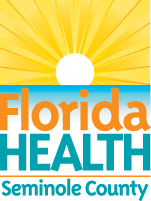It's a New Day in Public Health.
The Florida Department of Health works to protect, promote, and improve the health of all people in Florida through integrated state, county, and community efforts.
DOH-Seminole - Prevent Heat Related Injuries
May 17, 2019
Sanford, Fla. - Temperatures are starting to rise in Central Florida and now is the time to prepare for the prevention of heat related injuries that can occur while enjoying the summer months. The Seminole County Health Department urges residents to be aware of the signs and symptoms of heat exhaustion and heat stroke. Among the most susceptible to heat exhaustion and heat stroke are children, the elderly, people with underlying medical conditions, and people working or exercising in hot weather.
"Anyone working outside or enjoying outdoor activities should stay hydrated and take regular breaks in the shade or an air-conditioned location to keep the body from overheating," said Donna Walsh, health officer for the Seminole County Health Department. "Never leave children or pets alone in a car and remember to check on the elderly at least twice a day and closely watch them for signs of heat exhaustion or heat stroke."
Symptoms of heat exhaustion include heavy sweating, paleness, muscle cramps, tiredness, weakness, dizziness, headache, nausea or vomiting, and fainting. Symptoms of heat stroke include high body temperature above 103ºF, red, hot, and dry skin (no sweating), rapid and strong pulse, throbbing headache, dizziness, nausea, confusion and possible unconsciousness. Seek medical attention if experiencing symptoms of heat exhaustion or heat stroke.
On average, every 10 days a child dies from heatstroke in a vehicle. Young children are particularly at risk, as their bodies heat up three to five times faster than an adult's. Babies and young children can sometimes sleep so peacefully that parents can forget they are even there. The number of deaths from heatstroke can be reduced by remembering to ACT:
A: Avoid heatstroke-related injury and death by never leaving your child alone in a car, not even for a minute. And make sure to keep your car locked when you're not in it so kids don't get in on their own.
C: Create reminders by putting something in the back of your car next to your child such as a briefcase, a purse or a cell phone that is needed at your destination. This is especially important if you're not following your normal routine.
T: Take action. If you see a child alone in a car, call 911. Emergency personnel want you to call. They are trained to respond to these situations. One call could save a life.
Other important heat exhaustion/heat stroke prevention tips for everyone are:
Drink lots of water
Drink cool, non-alcoholic beverages
Get lots of rest
Take a cool shower or bath
Seek an air-conditioned location when possible
Wear lightweight and light-colored clothing
Do not engage in strenuous activities
For more information on health-related illness visit https://www.cdc.gov/extremeheat/ and for prevention information visit www.safekids.org/heatstroke.
About the Florida Department of Health
The department, nationally accredited by the Public Health Accreditation Board, works to protect, promote and improve the health of all people in Florida through integrated state, county and community efforts.
Follow us on Facebook, Instagram and Twitter at @HealthyFla. For more information about the Florida Department of Health, please visit www.FloridaHealth.gov.





Connect with DOH